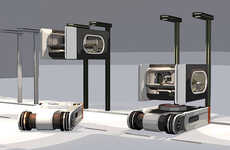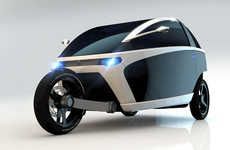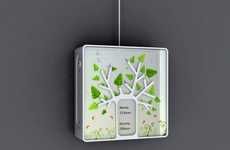
The 'Additive Manufacturing Integrated Energy' Project Examines Lifestyles
Michael Hemsworth — December 5, 2015 — Eco
References: web.ornl.gov & damngeeky
In order to fulfill future energy needs, a requirement for innovative approaches to dwellings and transportation is crucial, which is why the 'Additive Manufacturing Integrated Energy' Project helps to broaden how we think about human lifestyles.
Created by researchers at the Department of Energy’s Oak Ridge National Laboratory, the 'Additive Manufacturing Integrated Energy' Project features a home outfitted with solar panels; the home will store energy and channel it to the home or the vehicle depending on what needs it most.
The 'Additive Manufacturing Integrated Energy' Project approach helps to broaden our understanding of how we can live a modern lifestyle to utilize renewable energy sources to help life cleaner, more efficient lives that don't deviate too far from what residents of North America are accustomed to.
Created by researchers at the Department of Energy’s Oak Ridge National Laboratory, the 'Additive Manufacturing Integrated Energy' Project features a home outfitted with solar panels; the home will store energy and channel it to the home or the vehicle depending on what needs it most.
The 'Additive Manufacturing Integrated Energy' Project approach helps to broaden our understanding of how we can live a modern lifestyle to utilize renewable energy sources to help life cleaner, more efficient lives that don't deviate too far from what residents of North America are accustomed to.
Trend Themes
1. Renewable Energy Homes - There is an opportunity to design and build homes that can generate and store renewable energy to power both the home and personal vehicles.
2. Smart Homes - Incorporating technology to manage and distribute energy in a home can help to optimize energy usage, reducing waste and cost.
3. Sustainable Transportation - There is potential to develop vehicles that are designed to be charged by homes with renewable energy, reducing reliance on non-renewable fuels.
Industry Implications
1. Construction - The construction industry can embrace the use of renewable energy sources such as solar in home building to create sustainable and energy-efficient houses.
2. Energy - Energy companies can invest in research and development on integrating renewable energy into homes and buildings to provide customers with more sustainable energy options.
3. Automotive - Automotive companies should consider the potential of vehicles that are designed to be charged by renewable energy sources such as solar panels on homes.
3.2
Score
Popularity
Activity
Freshness























